
Does the idea of getting up on stage to share your message excite you? Do you have images of taking the stage by storm, moving millions to take action and transform their lives?
Does it then quickly morph into a dreaded knot of fear in the pit of your stomach and you dive into a downward spiral of self doubt?
Rest assured, you are not alone! And yet, wouldn’t you love to feel relaxed and confident — even happy — to be out there in front of an audience?
I’ve spoken to 47 experts who are here to do just that. They’ve shared with me their favorite routines, practices, and mindset hacks for overcoming fear in front of a crowd. Sit back, and relax into the wise counsel found in the experts below.
- Michael Port: Author | Public Speaking Coach
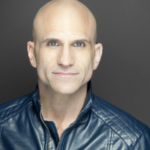
Michael Port
“Performers get stressed, nervous, and anxious, but they don’t think that their nerves will hinder their performance. They use that energy to focus themselves, drive their point right home to the audience, and make a difference.”
- Tamsen Webster: Keynote Speaker | Idea Whisperer | Change Strategist

Tamsen Webster
Executive Producer of TEDxCambridge, Tamsen Webster says her #1 tip for overcoming nerves is to “check your dignity at the door.” In other words, focus on delivering the message in the way the audience most needs it. “Be what the message needs, no matter what,” Webster says.
- Kit Pang: Founder of BostonSpeaks | Speaker Coach | Keynote Speaker

Kit Pang
“Get yourself mentally prepared. Ask yourself: What is your state of mind? Great public speaking doesn’t begin on stage, it begins when you are preparing to speak.
For example, what do athletes do before they play for the world championship game? They sit on a bus and listen for motivational music to pump themselves up! What do great speakers do before they speak to a million people? They pump themselves up and change their mindsets to: I’ve got this and I’m going to rock the stage!
What are some ways you can change your state of mind before you speak? This applies to networking events when you have to go around the table and introduce yourself, and this will work when you are the next speaker up. “Personally, I think of three things,” says Pang. “First, How can I really help the audience? Second, I am going to rock the stage and look at everyone in the eyes to build connection. And third, It’s time to be myself, because I spent so much time practicing — it’s SHOWTIME!”
Great public speaking doesn’t begin on stage, it begins when you are preparing to speak. Share on X
- Tracy Otsuka: Attorney | Entrepreneur | Founder of Coretography

Tracy Otsuka
I don’t begin speaking until all eyes are on me,” she says. “Then, I slowly look around the room and I take in all the love, support and well wishes from my audience that I hit a home run.”
- Linda Ugelow: Speaking Mentor | Coach | Performer | Producer & Host

Linda Ugelow
“For permanently overcoming nervousness, I recommend de-cluttering or clearing out what I’ve come to call the psychic closet: those impacting past experiences, limiting beliefs, and damaging self-criticisms. These are the burdens and obstacles that we find ourselves having to push past as the sensations of fear threaten to overtake us.
For instance, I’ve never come across a single client who wished to overcome their fear of speaking up and didn’t have to fend off debilitating charges of incompetency from within. As much as we fear rejection from the outside, everyone is astonished to see how harsh their own self-criticisms are when they’re spoken out loud. No one would say to a person they cared about, “You don’t know what you’re doing, you’re going to mess up, you’re a wreck.” Yet we easily repeat these remarks to ourselves. Therefore, learning new habits of inner speech is essential for dealing with fear.
For me, the best practice to feel relaxed and comfortable in front of people has been doing just that — relaxing and getting comfortable in front of people. I don’t mean talking in front of people, I mean simply standing looking into the eyes of a friend or partner, breathing, relaxing, smiling, and being present. This is very powerful, and if you’ve never done such an exercise before, a little unnerving at first. But if you can’t relax in front of a single person, how do you expect to do that on stage in front of dozens or hundreds?
You can then do the same with a supportive group. Stand in front of them and look at each in turn for a few breaths each while you relax, feel their support, allow yourself to be seen, and communicate your own seeing of them with your eyes. This exercise will deepen your sense of presence and build your capacity to feel more in your body.
My personal favorite practice for going into a presentation is visualization. I first imagine how I want to feel as I prepare, as I travel to the event, and during the moments leading up to going before the audience. I see myself on stage standing confident and relaxed — speaking with inner authority and presence, comfortably shifting emotional qualities of humor and poignancy. And I imagine how I feel afterwards as well, visualizing people coming to speak with me with warm hugs and feedback. I feel myself feeling happy and satisfied. Although I use this practice in advance, as I move closer to the event, if I sense some stress trickling in, I use that stress as a reminder to ground myself in this focusing visualization.”
Learning new habits of inner speech is essential for dealing with fear. Share on X
- R. Shawn McBride: Lawyer | Speaker | Author | Business Strategist

Shawn McBride
Shawn cites a few things that have helped him become a better speaker:
Knowledge: “I’ve learned what to do and what not to do on stage. I’ve studied it as an art. As I gained more knowledge of speaking, it helped me increase my confidence and feel less nervous. As I felt more comfortable in my knowledge of my subject matter as an attorney and business strategist, I found that my speaking became easier.”
Practice and repetition: “The more audiences you get in front of, and see what can go wrong and learn how to fix things, the more experienced you become. When you’re inexperienced, you become nervous about how to interact with audiences, dealing with tough questions, and, of course, hecklers. But after you’ve dealt with them, your confidence skyrockets.”
- Keisha P. Shields: Powerhouse Speaker | Coach | CEO

Keisha P. Shields
“Imagine that when you look out into the crowd, it is an audience full of your friends and that every single person there is rooting for you and wanting you to knock it out of the park!”
- Tyler Basu: Content Marketer | Podcast Host | Author | Publisher

Tyler Basu
“The first is practice (sorry, no shortcut there). The more you speak, both in-person and online,” he says, “the more competent — and therefore, confident — you will become.”
The second is to review the recordings of his presentations, whenever possible. He describes using this strategy with a recent presentation he gave in a private training session:
“Before giving [the presentation], I was instructed to be as expressive and energetic as I possibly could. To my own surprise, I did exactly that. Upon watching the recording later that evening, I realized that my performance was not nearly as outrageous and dramatic as I thought it must have appeared to be. It was actually quite entertaining. That experience taught me that it is okay to be very expressive and have fun as a speaker. When you find a way to have fun with your presentation, your audience will most likely appreciate the experience.
The facilitator told me to be a “10 out of 10″ in energy/enthusiasm, etc. I really pushed myself to do so, thinking that it must have been too much energy. When I watched the video I realized that if I had just toned it down a little bit — to an 8 or a 9 — it would have been a great performance, and not nearly as ridiculous as I felt like it would be. But even at a 10, it was entertaining (in a good way).”
When you find a way to have fun, your audience will most likely appreciate the experience. Share on X
- Adria DeCorte: Clarity Coach | TEDx Speaker | Podcast Host

Adria DeCorte
“I didn’t get the gene for enjoying the spotlight,” business strategist Adria DeCorte recalls. “I grew up a painfully shy child and, believe me, I still get knots in my stomach the entire week before I’m scheduled to get in front of an audience.
What allows me to continue to get on stage is remembering that my words are in service of my audience — that it’s not actually about me.
It happens every time – I’ll be geared up to do a talk, feeling sensation run up and down my body, And then, as soon as I step on stage, grab the mic, and look out at the audience, the worry melts away. I’m there for them, and they aren’t judging me — they are hearing my words, listening to my stories, and being transformed. Suddenly I step into my power and the sensation that I mistook as nervousness shifts into the energy to deliver my message.”
- Marsha Shandur: Storytelling Coach | Networking Mentor | Memory Scavenger

Marsha Shandur
Marsha Shandur, founder of YesYesMarsha.com, shares two favorite tips that have helped her build her confidence:
Spend at least two minutes in a power pose. As reported by Harvard psychologist Amy Cuddy, “power poses” lower your cortisol (stress hormone) and raise your testosterone (confidence hormone). It’s astonishingly effective, says Shandur. “Ideally, I try and stand somewhere out of sight with my arms up in a V. If that’s not possible, I stand with my hands on my hips, Wonderwoman-style. Or if I’m sitting down, I’ll spread my arms on the back of the chairs either side, and make my legs as wide as my skirt will allow.”
Say “I’m excited” out loud. Shandur learned this trick from Vanessa Van Edwards. Edwards told her about an experiment where speakers, before they went onstage, would say out loud, “I’m excited”. Irrespective of how they felt in advance, if they said these words, they would perform substantially better. So, just before she goes onstage, Shandur mutters to herself the words “I’m excited” — and it works!
- Susan Schenk: Author | Speaker | Entrepreneur
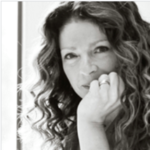
Susan Schenk
Susan Schenk felt that she needed to speak in order to share her story and message about learning differences. That was the driving force behind her stepping onto the stage and sharing her message with others. Here are her tips:
Know why you want to speak.
Be patient when it comes to speaking on the stage — it can take time.
Start speaking on video and on podcasts.
Take baby steps and soon you will be amazed where you are when it comes to your speaking comfort and focus.
Be patient when it comes to speaking on the stage -- it can take time. Share on X
- Suzanne Jones: Speaking Coach

Suzanne Jones
Suzanne Jones, one of Australia’s leading coaches in the art of public speaking and a firm believer in the importance of breathing and eye contact, advises:
“Have a set plan and focus on it. Before speaking, breathe through your nose look around and make eye contact with your audience. Take another deep breath through your nose and begin speaking — make it a habit to breathe through your nose and make eye contact before uttering a word.”
- Duda Jadrijevic: Buddhist Transformational Speaker | Coach | Serial Entrepreneur

Duda Jadrijevic
According to Duda Jadrijevic, the mindset behind a confident speaker that inspires the audience is one where the reason for being on the stage is clear:
“You are there to help others with your expertise,” she says. “Focusing on how you can help the audience will put the spotlight from you being on the stage exposed onto the audience hungry for your answers.”
She also suggests meditating and breathing the night before and the morning of your speaking gig. “If possible don’t engage with the rest of the crew until after your talk,” she says. “Just focus on the service to others; the words and confidence will inevitably serve you in return.”
Just focus on the service to others; the words and confidence will inevitably serve you in return. Share on X
- Julie Austin: Author | Inventor | Futurist | Corporate Keynote Speaker

Julie Austin
“My best tip for overcoming nervousness as a speaker is to have fun,” Julie Austin says. “The audience is rooting for you and wants you to succeed. If you are having fun and you are giving them great information, they will have fun and be focused on what you’re saying.”
Austin urges speakers to not underestimate their own expertise. “Remember, you’re the expert on your topic,” she advises. “Helps you forget all about nerves.”
- Stacy Caprio: Search Marketing Manager | Marketer | Founder

Stacy Caprio
Stacy’s #1 tip to overcome nervousness before a speech? Cultivate a specific perspective and mindset beforehand. “For me, the best perspective to cultivate has been thinking about how much fun I will have with the audience sharing what I love, and making sure I feel only goodwill and positive energy toward everyone before starting,” she notes. “Getting in this mindset of fun and positivity takes away the negative energy and nerves.”
- Paige Arnof-Fenn: Founder & CEO | Marketer | Writer

Paige Arnof-Fenn
For Paige Arnof-Fenn, founder of global marketing firm Mavens & Moguls, the best tip is to practice your presentation until you can do it with total confidence. “When you know the material cold there is no need to be nervous,” she says. “Know what stories to use to make each point and the audience will be with you. Just smile and go for it. Nothing beats being prepared, taking a deep breath, and smiling.”
Nothing beats being prepared, taking a deep breath, and smiling. Share on X
- Sally Foley-Lewis: Speaker | Trainer | MC

Sally Foley-Lewis
“Stop trying to get rid of your nerves; instead, thank them for turning up and giving you energy that you can redirect into your speech and presenting,” she says, echoing Michael Port’s advice. The audience wants an engaging and enthusiastic speaker, so Foley-Lewis recommends letting the energy from your nerves help you deliver that energy and enthusiasm.
“It starts with how you define your nerves and their purpose,” Foley-Lewis states. “If I’m not nervous, then I’m worried as I may be being complacent about the speech. I love my nerves and my mantra is ‘use my nerve to serve’! ”
- Gai Williams: Pharmacist | Author | Business Owner

Gai Williams
Many years ago, as Chairman of the Board of a pharmacy company, Gai Williams had to deliver a report at a conference, and she followed someone whose presentation had nearly put the audience to sleep. As she started, she noticed that everyone’s eyes had glazed over — so she threw her notes up in the air and said, “At least if you don’t listen to me, you may remember I had good legs!”
From that moment on, everyone laughed and sat up, and Williams delivered a shortened report in her own words. It was all a big success. So, Williams’ advice is as follows: “Gauge the mood of your audience, put yourself in their shoes and deliver interest and humor. If you’re natural and adaptable, you really can’t go wrong!”
Gauge the mood of your audience, put yourself in their shoes and deliver interest and humor. Share on X
- Tim Lea: Blockchain Entrepreneur & Evangelist | Author | Speaker & Filmmaker

Tim Lea
“Be 150% prepared for your talk,” Tim Lea suggests. “Know your material inside and out; know your audience, and make sure the two are aligned. People are there to see your material — you are the expert.”
Lea advises to practice speaking slowly and with purpose, leaving spaces for the audience to absorb your key points. Also, he recommends including some interactivity early on, as it puts your audience on their toes — so they become nervous of you asking them a question. In his own words: “Practice, practice, practice, and when you are on stage, the content will flow naturally you can make the most of your time.”
- Bronwen Sciortino: Author | Simplicity Expert | Professional Speaker

Bronwen Sciortino
Sciortino’s favorite tip for public speaking is to always speak about the things you’re most passionate about. “When you talk about the things that touch your heart,” she says, “you can’t help but be confident in what you say.”
This makes sense: after all, the things you are most passionate about are the things you know most intimately. “When you focus on your passion, you will always have something to say,” Sciortino adds. “When you’re being yourself, the audience can’t help but engage with your words — they’ll recognize your authenticity and the voice you give to your work.”
When you focus on your passion, you will always have something to say. Share on X
- Zoë Routh: Leadership Expert | Author

Zoë Routh
“Purpose gives you power,” Routh says. She believes that having a strong sense of purpose can crush fear. “When your message aligns with your values, you can feel a deep resonance that quells the fear. Your purpose is bigger than your worries!”
She adds: “Imagine if Martin Luther King had let his inner doubts keep him small. There would be no ‘I have a dream’ speech. You don’t need to be King; just hold on tight to what matters most.”
- Dominic Soh: Coach | Author

Dominic Soh
“During one of my previous speaking engagements at Chartered Accountants, I had the opportunity to speak to more than a hundred industry professionals, managers, and executives. Many were seriously above my paygrade. So I was really nervous and wondered whether what I had to offer was good enough. However, I made myself get out of my own head. I told myself that it’s not about me, but about the audience.
“If I hold back or restrain myself out of fear or anxiety, I am being selfish. Why? Because I would be doing the audience a disservice by not giving them my all and my 150%. Thus, whenever I get nervous, I reframe the entire situation to focus the attention on adding value to the audience, not obsessing about my nerves.”
- Sarah Tippett: Editor

Sarah Tippett
Tippett, editor of Homeschool Base, a free, volunteer-driven homeschool and educational website, notes that there is a significant difference between spoken and written word. This is why speeches that are written beforehand can seem unnatural when spoken out loud. Therefore, she suggests having an outline of what you want to say and winging the rest. Recording yourself for a few days leading up to the speech can also help you get over nerves and discomfort.
“A practiced speech is a good speech,” Tippett says. “No matter what, rehearse, rehearse, rehearse and get rid of those ums.”
A practiced speech is a good speech... rehearse, rehearse, rehearse and get rid of those ums. Share on X
- Michael Oon: Coach

Michael Oon
To Michael, the best way to overcome nervousness is to know your stuff. Rehearse many times when you’re driving to work or when you’re walking the dog or just in front of your bath mirror.
When you know your content as if you’ve memorized the song lyrics, your self-confidence overrides the nervousness. You know you are prepared.
Whether you’re presenting to a big or small audience or in front of a camera, knowing what you’re about to say stills your nerves, calm any anxieties and builds confidence.
- Karen Phillip: Counselling Psychotherapist | Clinical Hypnotherapist

Karen Phillip
Karen Phillip, the creator of Virtual Hypnotherapy, helps people to resolve issues and improve their life naturally, quickly, and easily by using specifically designed therapeutic hypnosis sessions, including fear of public speaking.
“I was hesitant initially when I started speaking to groups,” Phillip says. “I used self-hypnosis to alleviate my fears before writing a session for myself to listen to. It worked brilliantly. I now not only speak in front of hundreds, but I also do regular television without any fear.”
- Mallie Rydzik: Strategist | Coach

Mallie Rydzik
Mallie Rydzik is a strategist and coach to visionary creative entrepreneurs. She is on a mission to change the way the world works after diagnoses of three mental illnesses during a PhD program led her to rediscover how life and work intersect.
“Before I go on stage, I remind myself that this talk is not about me,” Rydzik reports. “It’s about the audience. When I put myself in the mindset of teaching, inspiring, and motivating, it takes me out of my ego and into a place of service.”
Before I go on stage, I remind myself that this talk is not about me, it's about the audience. Share on X
- Tassey Russo: Business Consultant | Coach

Tassey Russo
Business consultant and coach Tassey Russo speaks about her experience overcoming fear of public speaking:
“I love being on stage but, yes, there is swelling nervousness as I approach the actual time to be on stage. It’s not nearly as bad as it was when I first started speaking. Through the years, I have found that the best way for me to control this case of jitters is actually not at the moment, but instead, prior to the time I will speak. It’s all about the preparation and practice for me.
“Once I have chosen or been given the topic and I have done required research or jotted down my main points, I fully write out the speech. I then read it at least twice, using a yellow marker to highlight the key points I want to be sure to remember or emphasize. Then it’s on to reading it out loud, beginning to memorize it. When I have a command of the speech, I record myself (audio only) at least three or four times. After each recording I listen to it, as an audience member would, and then make changes based on how it sounds to me from this perspective of being in the audience. Following all this preparation and rehearsal, I think about movement on stage, and then I finally wed the spoken word with the physical aspects of the speech.
“The preparation and rehearsal that I work through for a speech allows me to feel confident because I know the material and know how I want to deliver it so once I am on stage, I can own it. Oh, yes, there are still jitters, but I quietly remind myself that “I’ve got this” and push through to delivery.”
- Jo-Ann Blondin: Marketer

Jo-Ann Blondin
In terms of public speaking, Blondin advises doing a dry run in front of your peers or people you respect, asking for feedback, and then implementing their suggestions. “Practice your talk many times so you can avoid using notes,” she recommends. “When you’re comfortable with your talk, your nervousness will turn into excitement to share your story.”
When you're comfortable, your nervousness will turn into excitement to share your story. Share on X
- Kelly Kozaris: Coach
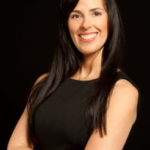
Kelly Kozaris
Mindset and Business Confidence Coach Kelly Kozaris unlocks the talent and “inner game changer” in others to confidently realize their potential to achieve ultimate success in business and life.
“I do voice exercises to make my voice strong and clear, and also listen to fun upbeat music to create extra energy and a great vibe!” Kozaris says of overcoming nervousness in speeches and presentations. “I also do affirmations prior to the event on how my speaking will impact people’s lives.”
- Cathy Chiba: Business Owner | Public Speaker

Cathy Chiba
“When I worked at the science center, I often watched my colleagues do their shows, and watched the audiences watch them. We were all different. Some of us were very, very good, but there wasn’t one way of being good.
“Some were flamboyant, some were polished, and some were just quietly, compellingly odd. Some used comedy and schtick to move their shows along; others made audiences fall silent and rapt, speaking with soft, measured tones and long, thoughtful pauses. You don’t have to tell jokes if you don’t tell jokes.
“You don’t have to be a smooth talker, a salesman, or an actor with classical training. It’s okay to trip over words from time to time, or to blush when you’re just the tiniest bit flustered. One of my favorite performers blushed like a beacon, and he was absolutely loveable on stage. When people come to see you speak, they come to see — and connect with — a real human being.”
When people come to see you speak, they come to see -- and connect with -- a real human being. Share on X
- Theo Tsaousides: Neuropsychologist | Entrepreneur | Author

Theo Tsaousides
Theo Tsaousides, author of Brainblocks: Overcoming the 7 Hidden Barriers to Success, employs two primary strategies to overcome his nerves when giving a speech or presentation.
He finds something that he’s really excited to talk about to the audience — such as a piece of information, a statistic, an image, or an audience interaction experience. This ensures he’ll look forward to getting to the part of the speech or presentation where he shares that with the audience; this way, his nerves turn to anticipation.
He tries to keep a peaceful routine prior to going on, which helps him get grounded. “My favorite is a nice, quiet breakfast at a hotel or near the venue,” he says.
- Kimberly Allison: Director | CEO | Social Media Marketer

Kimberly Allison
Kimberly’s strategy for overcoming nerves in front of an audience: “I get there early and meet some of the attendees before my talk. Then I can look at certain people in the room with comfort of meeting them prior to the talk.”
Allison also likes to incorporate dance into her talks. This puts her into the zone of sharing her heart & soul, and being on purpose.
- Perpetua Neo: Psychotherapist | Coach

Perpetua Neo
“Remember that you have a lot to offer to the audience,” Neo says of overcoming nerves in front of an audience. She continues:
“First, acknowledge the feeling you have kindly, rather than shoving it away. Then, remember that you have so much to offer to the audience, because you believe in your message. Tap into that feeling in your body, and breathe it all over your body. As you do that, you’ll let the sense of giving and abundance spread over you, psyching you up mind, body and soul into your talk/performance.
“The other thing is to do a smile meditation. As you breathe in deeply, focus on the breath entering through your nose. As you breathe out, feel your face and heart crinkle into a smile. Repeat 7 times.”
Remember that you have so much to offer to the audience, because you believe in your message. Share on X
- Shola Richards: Keynote Speaker | Author | Workplace Positivity Expert

Shola Richards
Shola Richards is the author of Making Work Work. As a workplace positivity expert, Richards is committed to ending generations of professional suffering in America.
Shola’s all-time best nervousness advice is to rehearse a ton! And once he’s about to go on stage, he reminds himself that his talk is not about him by saying, “I am here to serve” out loud three times. Then, to calm his nerves, he says, “I am ready” out loud three times. Then, he hits the stage.
- Jeremiah Hartmann: Professional Master of Ceremonies

Jeremiah Hartmann
As a Master of Ceremonies, speaking to a crowd is a fundamental part of Jeremiah’s job. Here’s how Hartmann overcomes his nerves when in front of an audience or camera:
“On most occasions, I will be speaking to an unfamiliar crowd, so it is critical that I make the perfect impression from the get-go.”
No matter if it’s in front of 300 or 3000 people, the first and most crucial task of any Master of Ceremonies is to capture a disengaged audience, followed by an official welcome to open the night and then set the mood for what’s coming up next. Easy, right?
“As soon as I step up on stage and commence speaking I have around 15-20 seconds to accomplish this. If this takes any longer I would have lost credibility and authority with my audience meaning it will be a long night of winning them back (if I’m lucky).
As much as I relish the idea of speaking to a crowd and doing something I love I still get a nervous kick around 20 minutes before I step up on stage. Sometimes it can feel overwhelming.
This will include a beating heart that wants to jump out of my chest, a dry mouth, unease in the stomach and the need to move about. Then there is the fear of mucking something up and looking like a real goose. But as the saying goes, if you don’t believe what you have to say is important, then don’t bother saying it at all.
I remind myself that feeling nervous is a key part of the process I experience before I am about to do something that is more than my usual self.
To help overcoming this nervousness I would verbally talk out loud to my nerves as if they were a physical person. (I do this in secret where I can be alone such as the green room, backstage, or as I’m pacing the hallway. As you know, being caught talking to yourself can be seen as a little crazy.)
The point of this is to make what I am feeling as tangible as possible. I convert the wispy irrational feelings into something that I can address one on one.
I usually say something like: “Oh hi there Mr. Nerves, you’re always here just before I am about to do something amazing. I know you’ve got to do your job and make me feel like this but as you know, I have a job to do too and I will do this job with or without you in my way.
I don’t ignore or fight the nerves; rather, I acknowledge that experiencing the nerves comes with the territory.”
I don't fight the nerves; I acknowledge that experiencing the nerves comes with the territory. Share on X
- Courtney Daniel: Stationery Designer

Courtney Daniel
Courtney Daniel’s routine to overcome nervousness is simple: she writes down three to five key points that she can elaborate on, and keeps them handy if need be. She makes sure her points are actionable and easy to comprehend.
Daniel also makes it a point to interact with the crowd and add a bit of her personality into my presentation. Having these tips written down helps her to focus on my delivery and posture. “By the time I am done with the first point and have a reaction from the crowd, I am good to go,” she says.
- Amanda Goldman-Petri: Online Marketing Coach | Speaker

Amanda Goldman-Petri
“When I started out as an entrepreneur, I was 21 and self-conscious about people taking me seriously at such a young age. This brought up fears around speaking on stage, doing webinars, pitching myself to collaborators, and doing video. Today, I’ve confidently spoken on stage alongside many fellow millionaires and high profile influencers and am regularly invited as a keynote speaker at conferences across the globe.
I got here by revisiting the one big lesson I learned while recovering from PTSD: I’m not afraid of these things — my amygdala is! This means all that I have to do is retrain it! The best way to retrain your brain is by taking tiny imperfect actions, which will lead to bigger, bolder actions.
When I was hit by a van while walking across the street and almost died, I was petrified of everything. To heal, I started with just talking about it, then crossing the street assisted, then crossing unassisted, then being a passenger in the car, and then getting my learner’s permit. One tiny action spiraled into the next.
The same idea can be applied to speaking on stage. If it scares you, then perhaps first you simply perform the speech to yourself in private, and then the next week you record yourself performing the speech to yourself and share the recording with one person you trust; the next week after that, you perform it live in front of someone you trust, after that you perform it on a small stage, and then you grow up and up to bigger stages. In the beginning, your performance or speech itself are unimportant; it is the ACTION itself that matters most.
Remember: Tiny imperfect actions lead to bigger, bolder ones!”
Remember: Tiny imperfect actions lead to bigger, bolder ones! Share on X
- Eileen McGurty: Online Teaching Coach

Eileen McGurty
For McGurty, the first step to overcoming nerves is to simply acknowledge that you’re nervous: don’t dismiss it, or pretend that it isn’t there. If you try to sweep it under the rug, it will just come bite you from behind. But if you look at it head-on, you have a chance to transform it into something useful.
Once you accept that you are nervous, ask yourself how this voice of anxiety can help you be of better service to your audience. “Usually, I try to turn the energy outward so to engage the audience more deeply. Sometimes, it might mean that I should review something so I can be ultra clear in my explanations. Take a deep breath and listen to the nervousness; it will help you serve your audience if you are not afraid of it,” she explains.
Sometimes, McGurty opens by telling the audience that she’s a little nervous. This happened to her recently: “Despite speaking in front of audiences for nearly 2 decades, when I did my first Facebook Live, I had the jitters. So I simply began with a simple statement that it was my first time and that I was a bit anxious,” she recalls. Most of the nervousness dissipated quickly.
- Joyce Dias: Speaker | Leadership Consultant

Joyce Dias
When preparing to speak in public, internationally renowned speaker Dias reminds us of the 3 P’s: preparation (telling a story that makes a point), practice (for timing, delivery and audience response), and prayer (that her spoken words will translate into a message that will reach hearts and drive transformation). Then, she relaxes before taking the stage.
- Sue Dunlevie: Blogger

Sue Dunlevie
Sue Dunlevie helps bloggers make money with their blogs so they can work at home, be their own boss, and spend more time doing what they love.
Her biggest trick is to psych herself up in the restroom right before she speaks. She tells herself, “You’ve got this! You ARE the woman.” (Just make sure your mic isn’t on, like in the 30 Rock episode where Alec Baldwin does just that!)
- Dr. Arjun Rayapudi: Surgeon | Nutritionist | Speaker | Author

Dr. Arjun Rayapudi
Dr. Arjun Rayapudi speaks and writes about using food as medicine to prevent and reverse disease.
“Just before I speak to the audience, I speak to myself in my head,” Rayapudi says. “I say to myself that the purpose of my speech is to serve the audience and help them get healthy. My anxiety level comes down as I stop thinking about me and start thinking regarding serving the audience.”
My anxiety level comes down as I stop thinking about me and start serving the audience. Share on X
- Susan Sandler: Speaker | Difference-Maker

Susan Sandler
Susan Sandler helps successful women discover and live their passions so they can lead fulfilling lives. Her best tip for quelling nerves is meditation. “I have learned how to allow feelings, pictures and thoughts to come up and ‘witness’ them without getting caught up in the melodrama in my mind, which distorts reality,” she says.
43. Lisa Chuma: Personal Brand Strategist

Lisa Chuma
Lisa Chuma, founder and CEO of the Women’s Expo Switzerland, is on a mission to educate and empower women to build their personal brand so that they can be visible, stand out, and differentiate themselves.
“The fact that I have an audience that is sitting down and looking at me means I have something to say of great value otherwise they won’t be there,” Chuma says. “This empowers me.”
- Kortni Alston: Journalist | Strategist | Happiness Researcher

Kortni Alston
Dr. Kortni Alston, a happiness and employee engagement scholar, strategist, multimedia journalist, and educator, admits that public speaking can be a little nerve-wracking, even when you are a professional. Her preferred technique for building confidence? “My magical solution is visualization,” she says.
Alston begins with creating a mental image about the event — the audience, her message, and even how she will look, which includes her attire, body language, and facial expressions. Then, she sees herself on stage successfully speaking and engaging the audience. “This process makes me feel confident and experience high levels of positive emotions associated with the event,” she says.
- Michael Barber: Founder | Entrepreneur

Michael Barber
Michael Barber is the founder of barber&hewitt, and his work has been featured in The New York Times, The Wall Street Journal, and Forbes.
When presenting, Barber overcomes nerves by walking in the crowd and the stage, and sitting in the audience. “Take the time to get know your ‘home’ or speaking space,” he suggests. “As speakers, we are usually walking into a lot of unknowns, especially where we are speaking. By removing those unknowns and getting more comfortable in the space, we can focus on our content and our audience.”
Take the time to get know your speaking space so you can focus on your content and your audience. Share on X
- Danielle Reed: Authenticity Coach | Workshop Facilitator | Speaker

Danielle Reed
When stepping on stage, Danielle feels a mixture of bravery and fear. She offers a few of her favorite ways to deal with fear.
“When I step on stage I truly believe that there is one person in the audience who needs my message that day. I used to hold this expectation that I had to impact everyone listening. Not only is that unrealistic, but it also put unnecessary pressure on me, and made me hustle for acceptance. Knowing that someone is sitting in that audience waiting for my message is enough for me!
Karen Hutton taught me to breathe into my legs. When I am getting ready to go on stage, I notice that my legs get really shaky. That, in turn, tends to make my voice shaky. Before you step on stage, take a few deep breaths and feel the breath in your thighs. It works like magic every time!
I am imperfect. I am not going to knock it out of the park every time. That’s part of being human. If I fall on stage (not literally, although it can happen), and my speech isn’t my best — I connect back to my key values that brought me up there in the first place. When I remember that my values of legacy and authenticity are why I go on stage, that is enough. I am there to be real and to leave an impact and share my message.
I have an anthem that I listen to in my car before every talk I give. It grounds me, it reminds me to be brave and it connects me with my values. My song is “Brave” by Sara Bareilles.
Speaking isn’t easy, but it’s always worth it. Your story matters and there is always someone that needs your story that day!”
Your story matters and there is always someone that needs your story that day! Share on X
- Alexia Vernon: Speaker | Speaking Trainer
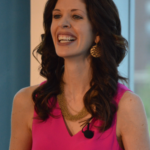
Alexia Vernon
“Put your focus 100 percent on your audience and how you can serve them,” Vernon suggests. “While this might sound like the opposite somebody experiencing public speaking anxiety should do, when you redirect away from wondering how people are thinking of you and instead put all of your energy and desire into giving to your audience, your fear will dissipate as you move from ego to love.”
A huge thanks to all the bloggers that contributed their wisdom to this roundup!
Now, I’d love to hear from you .
Do you have insights of your own to share?
 Linda Ugelow is a visibility confidence coach, helping entrepreneurs, business women and authors transform the way they feel being seen and heard on stage or on camera. Download the free manual: The Fear to Fabulous Blueprint: Mastering the Inner Game of Speaking on Stage or on Camera with Confidence and Charisma.
Linda Ugelow is a visibility confidence coach, helping entrepreneurs, business women and authors transform the way they feel being seen and heard on stage or on camera. Download the free manual: The Fear to Fabulous Blueprint: Mastering the Inner Game of Speaking on Stage or on Camera with Confidence and Charisma.
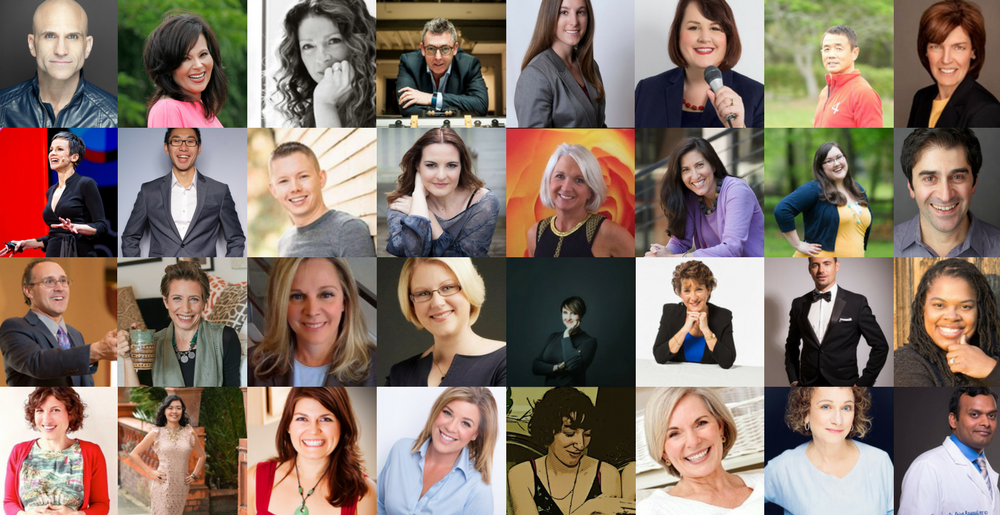

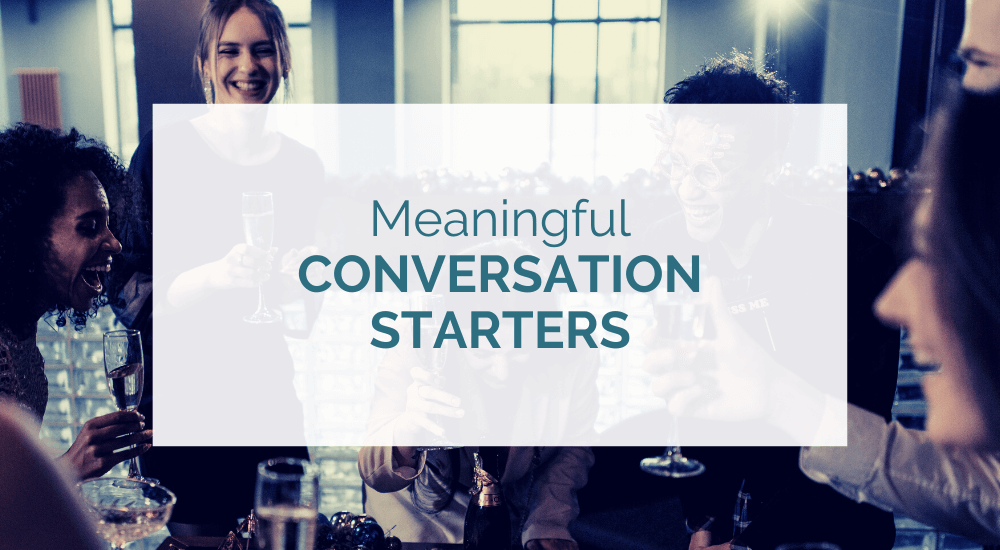
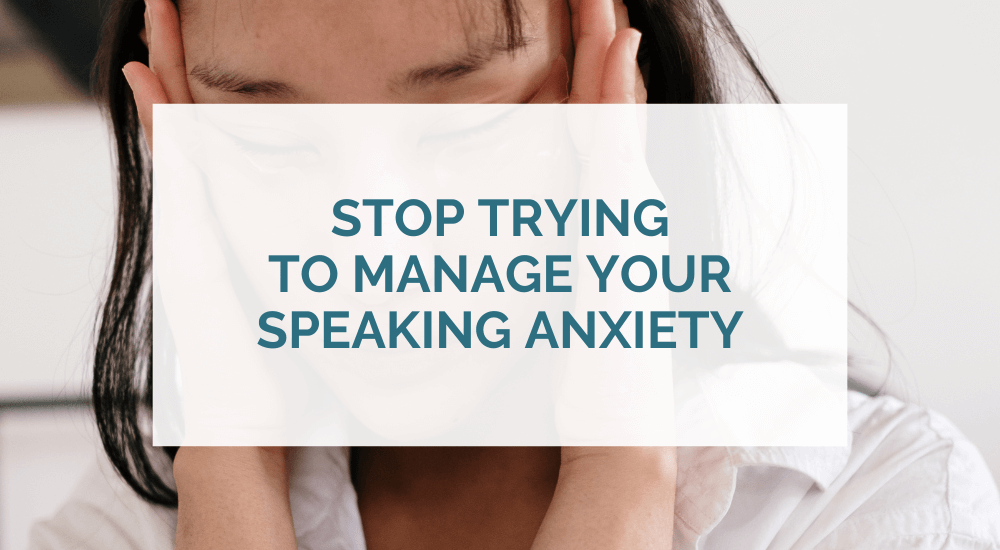
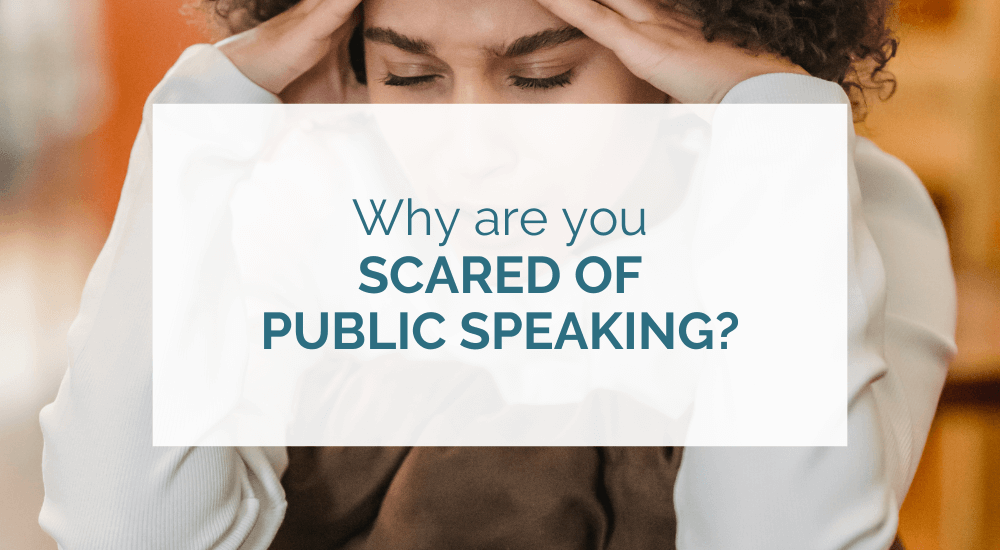
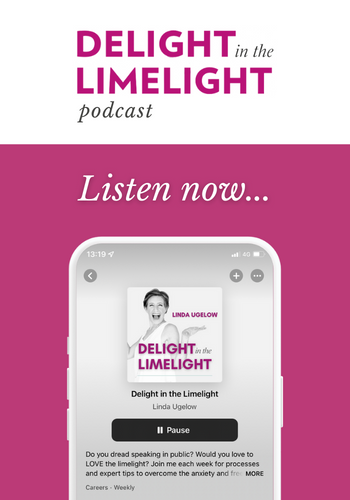
Just before you go on stage, you can try to memorize your speech one more time Also, as the article said, know what your topic is about. Make eye contact with your audience, but don’t focus on a particular person.
I will also, Linda!
Thank YOU, Sue, for your contribution. I’m going to be reviewing this post before every public event!
Loving me some Michael Port and Tracy Otsuka, nevermind all the other wonderful speakers you have here, Linda. Awesome advice from each one!
Thanks for including me.
Sue